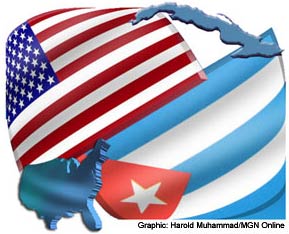- Bush’s new ‘axis of evil’–Castro and Chavez (FCN, 04-12-2005)
- Pope calls for lifting of U.S. embargo on Cuba (FCN, 01-26-2005)
- Cuba vows to fight against new U.S. sanctions (FCN, 05-23-2004)
- Cuba in the Cross-Hairs: A Near Half-Century of Terror (Trinicenter, 10-2003)
- Black journalists get close-up view of Cuba (FCN, 06-11-2002)

UNITED NATIONS (FinalCall.com) – For the 14th year in a row, the United Nations General Assembly overwhelmingly approved a resolution calling for an end to the 41-year-old commercial, economic and financial embargo imposed by the United States.

The embargo prohibits trade between the United States and Cuba. The only goods allowed into Cuba are medicine, medical supplies and food, which the U.S. grants the licenses to ship to Cuba from the U.S. But, the U.S has prohibited other nations from trade relations with Cuba. Travel to Cuba from the United States and elsewhere has dropped markedly since the imposition of what observers call heightened sanctions by the U.S.
The resolution passed with a vote of 182 in favor to four against (Israel, Marshall Islands, Palau and the U.S.), with one abstention (Federated States of Micronesia). Since the first resolution was presented in 1992, support has increased. The vote in 2004 was 179 in favor, with the same nations voting no and abstaining.
The Foreign Minister of Cuba, Felipe Perez Roque told the General Assembly that the embargo was “an economic war against Cuba, carried out on a global scale.”
The General Assembly also had before it a report by UN Secretary-General Kofi Annan on the necessity of ending the embargo, for which 85 governments submitted responses, according to a UN press release.
According to Cuban authorities, the accumulated direct economic damage to the Cuban economy brought about by the embargo exceeded $82 billion. Cuban officials say the negative impact of the blockade had been particularly felt in recent years due to the unprecedented number of natural disasters such as hurricanes and drought.
Introducing the resolution, Mr. Roque said that, over the decades-long blockade, the measures had not been enforced with such brutality as in the last 18 months. As a result, for the first time, an American would be barred from smoking a Cuban cigar even when traveling to another nation.
“Such insanity should go into the Guinness Book of World Records,” Mr. Roque told the assembly.
The Cuban Foreign Minister claimed that the embargo was depriving the U.S. of low-cost goods, like cholesterol-reducing drugs and drugs for HIV/AIDS.
U.S. Ambassador Ronald Godard said the trade embargo against Cuba was bilateral, or a matter between the two nations, which should not come up before the General Assembly. However, since Cuba had raised the issue, he maintained that he would respond, by saying that Cuban President Fidel Castro was using the embargo to blame the U.S. for the failures of his economic policies.
“If the people of Cuba are jobless, hungry or without medical care, as Mr. Castro admits, it is because of his economic mismanagement, not because of the embargo,” Mr. Godard contended.
He said the Cuban president continued with his “cynical baseless” claims that the embargo denied Cuba access to food and medicine, but he knew that since 1992, the United States had licensed over $1.1 billion in the sale and donation of medicines and medical equipment to the Cuban people, as well as over $5 billion worth of agricultural commodities in the past five years.
Representatives from 20 nations spoke in favor of lifting the embargo, such as Jamaica on behalf of the Group of 77 Developing Nations and China; Saint Lucia on behalf of the Caribbean Community (CARICOM); and Uruguay on behalf of the Southern Common Market (MERCOSUR).
Some of the most poignant remarks came from the representatives of China and Iran. Bai Yongjie, of China, said that Cuba’s normal economic, business and financial contacts had been arbitrarily cut off. While the U.S. has repeatedly stated that the embargo was a bilateral issue that shouldn’t be taken up by the assembly, Ms. Yongjie argued that, “The truth is that nearly 80 countries suffer economic losses from the embargo and sanctions against Cuba. The international community had every right to raise concerns about such practices and demand an immediate end to them.”
Javad Aghazadeh, of Iran, said the embargo had adversely affected all areas of the lives of Cuba’s people, including health, economy, education, trade, tourism, aviation, culture and sports. He said such policies stemmed only from “intolerance and enmity” towards other political, economic and social systems, and ran counter to protecting human rights and dignity.
“At the start of the 21st Century, the resort to unjustifiable economic coercive measures against States on the basis of political observations is not acceptable,” he argued.












